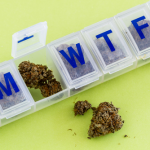Gov. Phil Murphy announced an overhaul of the state’s medical marijuana program on Tuesday that will make more people eligible for treatment, among other measures.
Murphy, who had ordered a review of the program as one of his first acts as governor, detailed the planned changes that also include lowered fees, expanded dispensaries and increases to product limits.
“We are changing the restrictive culture of our medical marijuana program to make it more patient-friendly,” Murphy said in a prepared statement. “We are adding five new categories of medical conditions, reducing patient and caregiver fees, and recommending changes in law so patients will be able to obtain the amount of product that they need. Some of these changes will take time, but we are committed to getting it done for all New Jersey residents who can be helped by access to medical marijuana.”
Health Commissioner Dr. Shereef Elnahal submitted a post-review report to Murphy that recommended more than 20 changes to the program. The recommendations are divided into three categories: those that become effective Tuesday, those that must go through a rulemaking process and those that need legislative action. Other recommendations touch on future initiatives such as home delivery, provider education and expedited permitting.
“As a physician, I have seen the therapeutic benefits of marijuana for patients with cancer and other difficult conditions,” Elnahal said in a statement. “These recommendations are informed by discussions with patients and their families, advocates, dispensary owners, clinicians and other health professionals on the Medicinal Marijuana Review Panel. We are reducing the barriers for all of these stakeholders, in order to allow many more patients to benefit from this effective treatment option.”
Elnahal said he has elevated the medical marijuana program to a division level, and a named a new assistant commissioner, Jeffrey A. Brown, to oversee it. Brown, who has worked for several New Jersey nonprofits, including the New Jersey Health Care Quality Institute, the New Jersey Hospital Alliance and New Jersey Citizen Action, will report to Jackie Cornell, the principal deputy commissioner who currently oversees the program.
“We are responsibly expanding the program,” Cornell said in a statement. “This is the beginning of the conversation, not the end.”
As of Tuesday, five new categories of medical conditions will be eligible for marijuana prescriptions:
- Anxiety;
- Migraines;
- Tourette’s syndrome;
- Chronic pain related to musculoskeletal disorders;
- Chronic visceral pain.
Under the new rule, Elnahal will be able to add other conditions at his discretion.
The other changes effective Tuesday include lowering the biennial patient registration fee to $100, from $200, and adding veterans and seniors to those qualified for a $20 discounted registration fee, the Governor’s Office said.
Other immediate changes include the lifting of the one-caregiver limit per patient; allowing Alternative Treatment Centers to open satellite locations, which is expected to increase supply in the short term; and enabling physicians who meet requirements of the program to prescribe marijuana without mandatory listing on a public registry.
Recommendations for legislative changes include increasing the monthly product limit, allowing adult patients access to edible products and eliminating the requirement that the first six ATCs be nonprofits — there are currently five ATCs operating in the state, with a sixth scheduled to open this spring.
The Health Department also proposed changing the ATC requirements so centers can specialize in one activity, including cultivating, manufacturing or dispensing, without being required to be involved in all three.
(229)





Leave A Reply